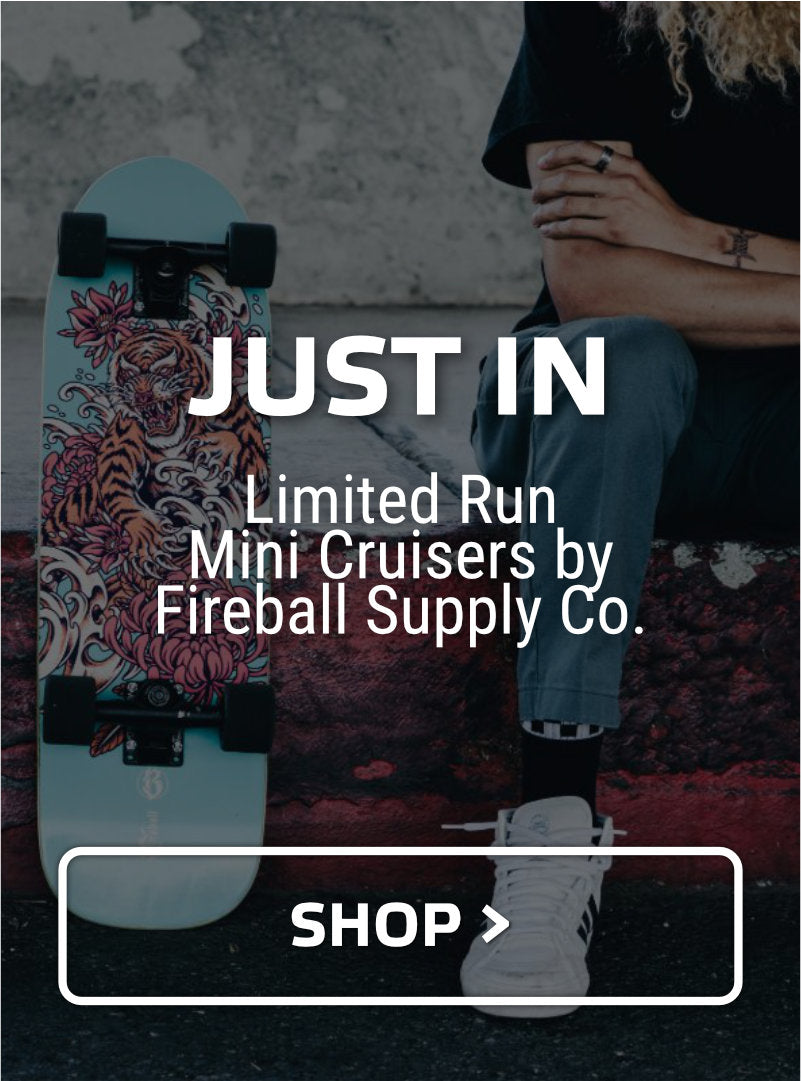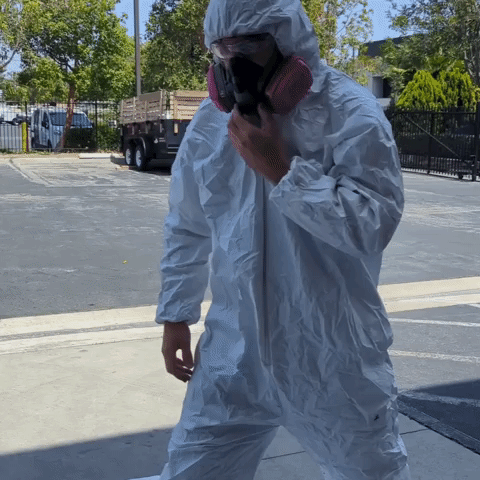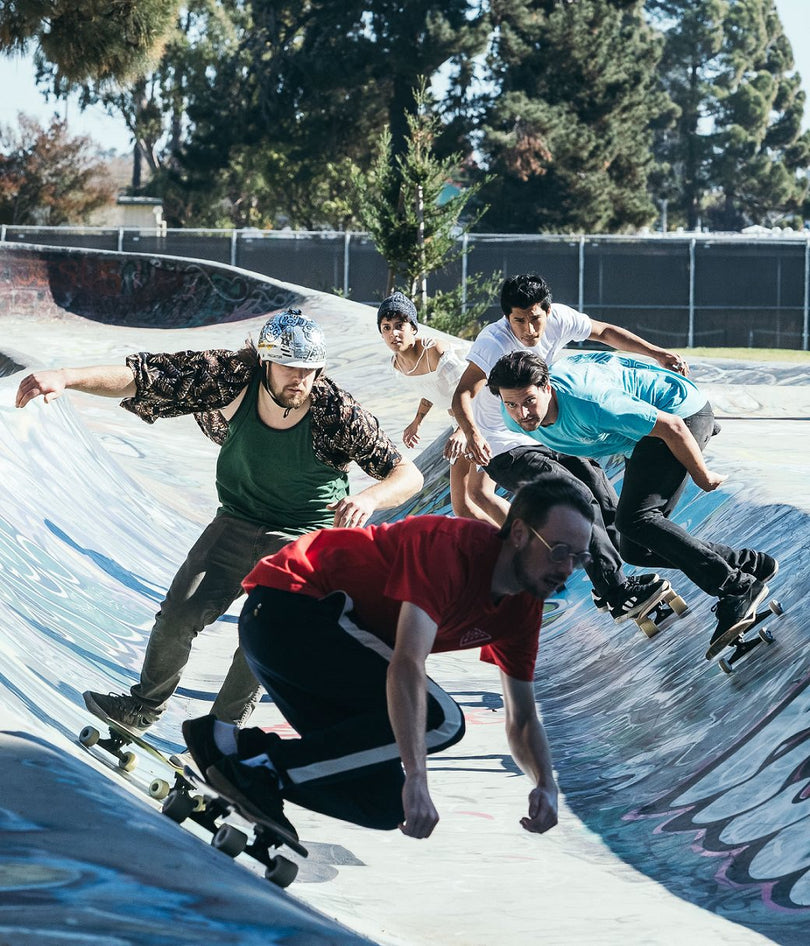In need of some new skateboard wheels? We got you. Skateboarding is a unique animal, and we’ll go over every exhaustive detail in this article - so let’s get started. For those who don't wish to learn, here are the 5 best skateboard wheels.
We are gonna assume you know you know a little about skateboarding already, enough to know you want some new wheels to shred the streets. If we assumed incorrectly, scroll down to the FAQ part of the article where we answer some more basic questions too.
Alright. So let's start with the question:
Which skateboard wheels are best?
Our answer: this depends on what type of skating you are looking to do, exactly. If you mostly skate smooth tarmac or ramps you'll want something hard, but if you are shredding the cobbled streets of London, you'll want something softer. See where we are going here? Let's break down the key questions to help you decide:
-
What is Durometer & how does it impact my skating?
-
What size skateboard wheels do I need?
-
Do skateboard wheels come in different shapes?
-
What are the best brands of skateboard wheels?
What is Durometer & how does it impact my skating?
The Durometer is the hardness or softness of the skateboard wheel. It is measured on the Shore Scale and runs from 0 to 100a, with 0 being soft AF and 100 being rock hard. Typically skateboard wheels are within the range of 70a to 100a.
The durometer of the wheel will affect how fast the urethane wears down, the speed of the wheels and how well it grips the ground. Softer wheels, from 70a - 90a, are good for cruising and rough surfaces, because they provide good grip and a smooth ride. Harder wheels, from 90a - 100a, are good for park, and vert skating because they wear down slower and roll faster on the smoother surfaces required with these disciplines.
|
Style |
Recommended Durometer |
|
|
Street - Standard |
92 - 99a |
|
|
Street - Rough |
78 - 81a |
|
|
Park |
97 - 100a |
|
|
Bowl |
100a |
|
|
Cruising |
78 - 81a |
|
What size skateboard wheels do I need??
The size of a skateboard wheel usually ranges from 50mm to 58mm in diameter, although some longboard wheels go up to 110mm! As this article is on skateboarding, we will stick to this area of expertise.
The smaller the wheel the faster you will accellerate, but the slower the top speed. The larger the wheel the slower you will accellerate, but the higher the top speed.
Generally, regular street skaters like 52 - 54mm as they are smaller and lighter (for flip tricks) and they don't need the high speeds of a downhill longboarder. Larger wheels, from 54mm - 58mm, are faster and better for rougher ground and transition. The larger 58mm+ wheels are great if you just want to cruise due to the larger surface area.
Pro Tip: One thing to be aware of is wheel bite. Wheel bite is when you turn the board and the wheels touch the deck, causing a sudden stop of motion, and you flying through the air. This is caused when you use too large of a wheel, without a riser pad. Other factors that weigh into this are how looose your trucks are and how much you weigh.
Below we have listed our recommendations for wheel size by skate style. We have also given general advice on if you need risers based on a standard human weight of 175lbs, with standard mid height trucks (note, truck heights to vary so be sure to check yours).
|
Style |
Size |
Riser Pad |
|
Street - Standard |
52mm - 54mm |
Not usually needed |
|
Street - Rough |
54mm - 56mm |
Not usually needed |
|
Park |
56mm - 58mm |
1/8" Riser recommended |
|
Bowl |
55mm - 58mm |
1/8" Riser recommended |
|
Cruising |
58mm - 60mm |
1/8" - 1/4" Riser recommended |
Do skateboard wheels come in different shapes?
They sure do! This is also known as the cut of the wheel, and refers to the cross sectional view of the wheel from the sidewall.
|
Wheel Shape |
Side Profile shape Image |
Features: |
|
Classic |
 |
Most common shape, with a round profile shape and smaller contact patch. Easier to slide and roll over copings. |
|
Conical |
 |
A wider contact patch for more grip. Usually these are lighter. Great for pool and transition. |
|
Radial |
 |
A radius profile with a wide contact patch. Provides more grip and support for grinds. |
What are the best brands of skateboard wheels?
Ok, now you've figured out what size and shape wheel you want for your particular style, let's get in to some of the best wheels by brand. The most popular wheel brands for skateboarding include Spitfire, Powell Peralta, Bones, Mini Logo and OJ Wheels.
Our top recommendation is Spitfire. These guys have the most options for sizes and profile shape, helping you to really dial in what works best for you. The print looks better than pretty much anything else on the market too. Spitfire's only downside is the durometers are all hard, so if you are looking for somthing softer you would be better off checking out Fireball Supply Co. or Ricta. These two brands make more all-around wheels or softer wheels for rougher ground that you can still shred on.
Ok, so that should give you an idea of how best to choose the right wheels for your ride. If you are looking for some recommendations, here are our top 3 skateboard wheels:
[What do you know about surfing?]
Frequently Asked Questions
Street skateboarding is a form of skateboarding that evolved from skating on sidewalks and streets. It is typically done using a board with smaller, softer wheels than those used for vert skating or aggressive skating. Street skateboarding tricks are based on the movements of surfing, skateboarding, and other extreme sports.
One of the first documented cases of street skateboarding took place in 1976, when 16 year old Jay Adams skated down a Los Angeles sidewalk on his surfboard. Adams is often credited as being the father of street skateboarding. Since then, street skateboarding has grown in popularity and become one of the most popular forms of skateboarding.
[What do you know about surfing?]
The 52mm wheel size is a great option for street skating, albeit on the smaller end. They offer good speed and maneuverability and are small and light which helps with flip tricks. See our recommendations in the article above for more info.
If you are looking to skate rougher streets, soft skateboard wheels (78a to 85a) can be a good bet. Soft wheels will cruise over smaller cracks and rocks in a way that harder wheels will not. Some wheels, such as Fireball Supply Co's Terra Wheels, balance this softer durometer with a hard core so you get the benefits of both a soft and a hard wheel in one - ability to skate rougher surfaces whilst still rolling fast and being able to powerslide.
If you are looking to skate skateparks, we recommend sticking to a harder durometer - from 97 - 100a. It is a lot of personal preference though, so you might need to try a few duros to figure out what you like best.
[Want to skateboard on bumpy roads?]
A skateboard is composed of several different parts, all of which work together to allow you to ride. The deck is the main platform that you stand on, and it is usually made from wood or composite materials. Attached to the deck are the trucks, which are two metal axles that support the wheels. The wheels are typically made from polyurethane and rotate freely on the trucks. Finally, there are the bearings, which sit inside of the wheels and help them rotate smoothly.
[Everything to know about an electric longboard.]
There is no doubt that street skateboarding is one of the most popular extreme sports in the world today. Street skateboarding involves skating on various types of terrain, including sidewalks, stairs, and handrails. It is a very challenging sport that requires a great deal of skill and coordination.
Some of the best street skateboarders in the world are listed below. These skaters have all made a name for themselves by performing some amazing tricks and stunts.
- Rodney Mullen: Rodney Mullen is widely considered to be one of the greatest street skateboarders of all time. He is credited with inventing many of the most popular tricks and techniques used by skaters today. Mullen has won numerous competitions and has been featured in numerous magazines and videos.
- Chris Cole: Chris Cole is another highly respected street skateboarder. He is known for his creative style and technical skills. Cole has won many competitions and has been featured in several magazines and videos.
- Danny Way: Danny Way is a legendary figure in the world of street skateboarding. He is known for his death-defying stunts, including jumping over the Great Wall of China on a skateboard. Way has also written a best-selling autobiography about his life and career.
- Tony Hawk: Tony Hawk is perhaps the most famous street skateboarder in the world. He is known for his daring tricks and impressive skating abilities. Hawk has appeared in numerous films and television shows, and he has also written a best-selling autobiography.
This is a difficult question to answer, as it depends on a number of factors such as your natural ability, how often you practice, and the difficulty of the tricks you are attempting to learn. Generally speaking, however, it takes most people several months to years to become proficient at street skateboarding. Even then, the ability to master technical tricks can take a lifetime. Look at Rodney Mullen, he is still inventing tricks to this day.
[The much loved Tech Deck.]














![Best Beginner Surfboards [An Epic Guide]](http://stokedrideshop.com/cdn/shop/articles/Best_Beginner_Surfboards_2000x.jpg?v=1664479709)
![Surfing [A Complete Guide]](http://stokedrideshop.com/cdn/shop/articles/Surfing_2000x.jpg?v=1664406826)